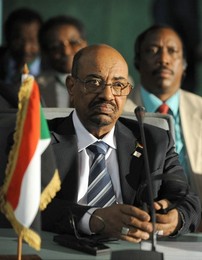Sudanese president to participate in extraordinary AU summit in Addis Ababa
October 10, 2013 (KHARTOUM) – The Sudanese president Omer Hassan al-Bashir will fly to the Ethiopian capital of Addis Ababa on Friday to participate in the two-day extraordinary African Union summit starting tomorrow.

Bashir himself is wanted by the ICC since 2009 on ten counts of war crimes, genocide and crimes against humanity he allegedly masterminded in Sudan’s western region of Darfur. Khartoum, a non-ICC member, has persistently urged its African peers to unsign the court’s Rome Statute.
The summit will also elect a new Commissioner for Peace and Security of the African Union after its previous chair Ramtane Lamamra was appointed as Algeria’s foreign minister.
African officials initially said that the summit will work to seek en masse withdrawal of African nations from the ICC particularly in response to the trial of Kenyan president Uhuru Kenyatta and his Deputy William Ruto.
However it is now looking increasingly unlikely that 34 African nations will agree on a mass walkout.
Kenyatta and Ruto face charges of crimes against humanity in connection with 2007-2008 Post Elections Violence (PEV). The hearing of the case against Ruto has already begun but Kenyatta’s is scheduled for November.
The ICC intervened after the Kenyan parliament shot down several attempts to establish a local tribunal in accordance with a power-sharing agreement brokered by former UN Secretary General Kofi Annan. Furthermore, many MP’s said they wanted the cases investigated at the Hague.
However, once the ICC prosecutor named the suspects he wants the judges to charge, the Kenyan government announced its intention to request a deferral pursuant to Article 16 of the Rome Statute which allows the UNSC to suspend the court’s process in a specific case for 12 months that can be renewed indefinitely.
After Kenyatta and Ruto won the presidential elections, they pushed the AU to issue a resolution to drop the case or refer the case back to Kenyan courts. The ICC judges can refer the cases back only if similar cases are brought against the pair in Kenyan courts.
Despite Nairobi’s denials, it is believed that Kenya and Uganda are spearheading the efforts for the mass pullouts.
Last month, the Kenyan parliament voted to pull out of the ICC but legal experts say the move would not halt the ongoing cases against the two men.
African nations have persistently accused the Hague-based court of targeting Africans only for prosecutions.
The ICC has opened investigations into eight cases, all of which are in Africa including Uganda, Democratic Republic of the Congo (DRC), Central African Republic (CAR), Darfur, Kenya, Libya, Côte d’Ivoire and Mali.
Five of the eight cases were referred voluntarily by the African governments in question; two through a UNSC resolution supported by the bulk of African members in the council at the time and one was opened at the ICC prosecutor’s request.
The AU has issued several resolutions in the past instructing its members not to cooperate with the court in the cases of Darfur and Libya.
Several major countries in African have indicated that they have no plans to withdraw from the court including South Africa, Nigeria, Botswana, Ivory Coast and Zambia.
The Tunisian President Moncef Marzouki said in statements this month that he informed AU Commission chairperson that his country will boycott the meeting and emphasized that there are a lot of dictators in Africa who are committing crimes.
Marzouki also disclosed that he has been talking to many African leaders to discourage them from withdrawing from the ICC.
A number of African figures including Annan and Archbishop Desmond Tutu have called on African nations to reject the withdrawal bid.
“While some African leaders play both the race and colonial cards, the facts are clear. Far from being a so-called white man’s witch hunt, the I.C.C. could not be more African if it tried. More than 20 African countries helped to found the I.C.C. Of the 108 nations that initially joined the I.C.C., 30 are in Africa. Five of the court’s 18 judges are African, as is its vice president, Sanji Mmasenono Monageng of Botswana. The court’s chief prosecutor, Fatou Bensouda, who has huge power over which cases are brought forward, is from Gambia. The I.C.C. is very clearly an African court,” Tutu wrote in an Op-ed published in the New York Times.
(ST)
